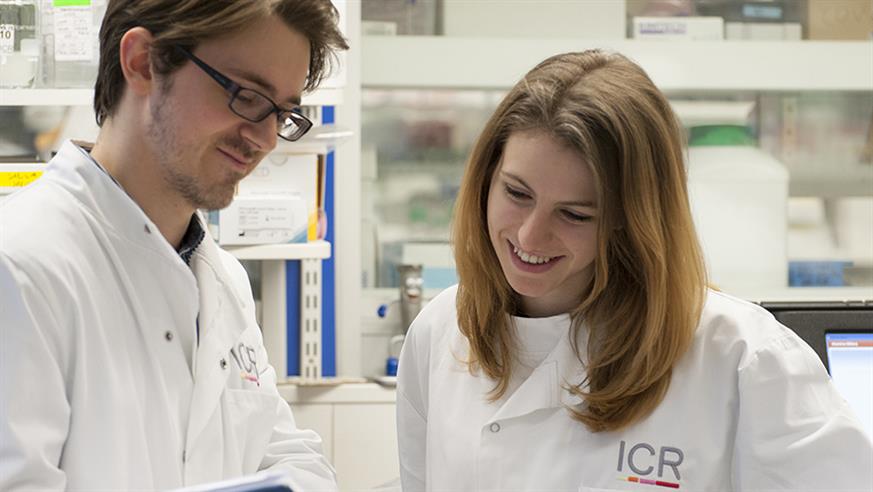
Image: ICR scientist and student in laboratory
During her second year studying maths at Oxford University, Isabelle saw the ICR’s Summer Vacation Scholarship Scheme advertised and decided to apply.
When I asked her what made her want to apply to the ICR scheme, she told me: “The research the ICR performs has an immeasurable global impact. I was struck by the approachability of the people who interviewed me and I was enticed to work in what appeared to me a welcoming and inclusive work environment.”
In the summer of 2018, Isabelle joined Professor Richard Houlston’s Molecular and Population Genetics team as a summer student. Her project would focus on the identifying the genes which, when faulty, may increase an individual’s susceptibility to developing brain tumours.
In particular she looked at gliomas – brain tumours which originate from cells which play a key role in supporting the nervous system, glial cells.
From passion to practice
As one of her key roles was to analyse the genetic information of patients with gliomas to detect these associations, the first step Isabelle took was to read up about gliomas – the most common type of brain tumour, accounting for around 80% of all adult brain tumours - and learn how to use the programmes that are required to analyse this data.
Isabelle explained:
“This studentship allowed me to apply my interest mathematics to an area of research I have not yet encountered, leaving me with a real insight into this important work. Not only did I discover a passion for coding but this skill is intrinsic to any computational research or data analysis I will undertake in the future.”
Initially, Isabelle said she struggled working with large sets of data, but her supervisor Dr Ben Kinnersley, a statistician in Professor Houlston’s lab, was on hand with tips and tricks to make it manageable, and there was always someone close at hand to answer any questions.
With the team’s help, Isabelle was soon making headway with her research and was able to discover previously unidentified genes which, when their regulation mechanisms are faulty or they are mutated, are associated with the development of brain gliomas – a finding that could fundamentally improve the understanding of how and why these tumours form, which is a key part of figuring out how to treat them effectively.
This work has now been published in the prestigious journal, Cancer Research, with Isabelle listed as a first author – an incredible achievement for an undergraduate student.
Immersion and support
“From the outset, Richard and Ben were very enthusiastic to produce a paper of high enough quality to be published. Having this target in mind really gave structure to the eight weeks I was there and a sense of purpose to my research.
“It also enabled me to have a truly immersive experience working within the field as I felt I was accomplishing something similar to what you would achieve if you were permanently employed at the ICR.”
As her supervisor, Dr Ben Kinnersley provided Isabelle with invaluable experience and guidance, but he also said he gained a lot from taking her under his wing. He said:
“I not only had an extra pair of hands to help around the lab, but was able to practise being a mentor. Having an undergraduate in the lab, who was interested and willing to learn specific skills, allowed me to pass some of my responsibility on to her, achieving results good enough to be published in a highly respected journal.”
Interested in studying at The Institute of Cancer Research? We are developing future leaders in clinical cancer research through our PhD and MD(Res) programmes.
Find out more
An eye-opening career experience
Isabelle described her experience at the ICR as a valuable one, working with a diverse set of colleagues in a professional environment which allowed her to learn useful new skills and an insight into what she as a mathematician could contribute to cancer research.
“I am now considering undertaking a PhD after I graduate, using my newly found skills of writing and publishing a scientific paper and passion for coding.
“My time at the ICR made me see a possible career in cancer research, an option I had not previously thought possible with my current degree in Maths.”
The ICR looks forward to welcoming the best and brightest of the UK’s undergraduates for in future summers, ready to contribute to ground-breaking research.
Applications for the 2019 Summer Vacation Scholarship Scheme close on Thursday 28 February.
comments powered by